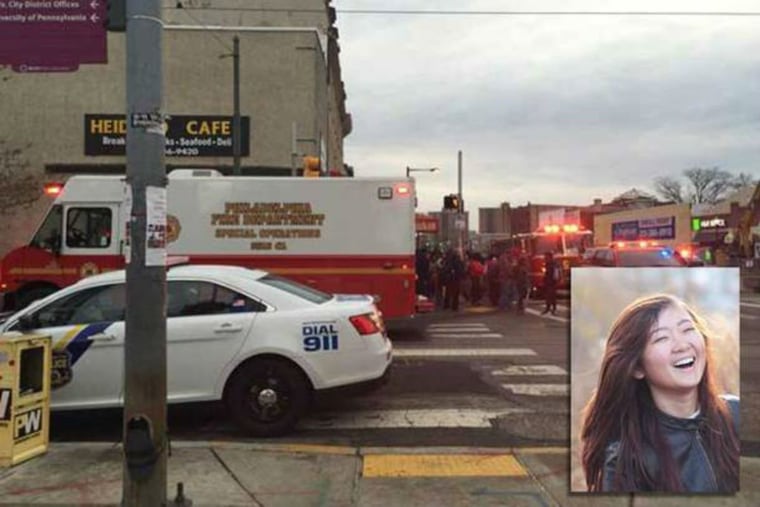Lawsuit over suicide of Penn student is settled just two days into the trial
On Wednesday, testimony began with jurors watching two hours of the 2019 video deposition by John Stein, the Penn psychiatrist who talked to Kong before her death.

The civil case in the 2016 suicide of a University of Pennsylvania student was settled Thursday morning after one day of testimony by two Penn health professionals who treated Ao “Olivia” Kong.
Neither the attorneys for Kong’s parents nor Penn would comment on or disclose the terms of the settlement. The trial was being held in the Philadelphia Common Pleas Court and had been expected to last for several weeks.
Kong’s parents, Xianguo Kong and Zhao Lin, who were in the courtroom this week, sued the university in 2018, alleging that in the days before Kong’s death, Penn employees, including a psychiatrist and counselors, were told at least nine times that she was stressed and suicidal. She even told the psychiatrist she intended to return to campus and kill herself. But the school failed to notify her parents, get Kong hospitalized, or otherwise intervene, her parents said. Kong, a Central High School graduate, was a 21-year-old student at Wharton when she went to the SEPTA station at 40th and Market Streets on an early April morning in 2016 to end her life.
» READ MORE: Civil trial over Penn suicide could shed light on a university’s responsibility for student mental health
Penn denied that it was culpable and said the university’s professionals made multiple efforts to help Kong, giving her counseling, support, and resources available at all times. Suicide is unpredictable, most people who have suicidal thoughts do not die by suicide, and in Kong’s case, no one was to blame, officials said.
» READ MORE: Penn moves mental health and wellness programs under the direction of the provost
On Wednesday, testimony began with jurors watching two hours of a 2019 video deposition by John Stein, the Penn psychiatrist who works for the university’s counseling and psychological services (CAPS). He talked to Kong on Thursday, four days before her death, and again on Saturday, when he acknowledged her condition had worsened.
In the days leading up to her death, Kong reported she was unable to sleep more than an hour, that she was depressed, having panic attacks and that she had current thoughts of suicide.
» READ MORE: Parents of Penn suicide victim sue university
Stein said he asked Kong if she would go to a hospital, but she declined. He told her an ER visit would cost less than funeral arrangements, he said.
“So clearly you thought at the time of this phone call that she was at risk of having a funeral?” asked the lawyer for Kong’s parents, Carol Nelson Shepherd.
“It was something that I thought was a possibility, yes,” Stein responded.
But Stein said he did not think it was “clinically warranted” to compel Kong to go to an emergency room or break her confidentiality and call her parents. Instead he developed a plan with Kong, including her commitment to attend an appointment at CAPS on Monday.
On Saturday or Sunday — he wasn’t sure which — Stein said he called then-CAPS director William Alexander because he knew Kong was in “significant distress” and he was “concerned about her well-being.” Specifically, he was concerned about her suicidal ideation and safety, he said. He wanted to get Alexander’s opinion of his “intervention” and “clinical decision-making,” he said. He testified that he did not reach Alexander and did not hear back from him.
During opening statements, Shepherd said there were no phone records of such a call and that Alexander said he didn’t //receive one.
After Kong died, Stein testified, he wrote a “recollection” in her file.
“Did you have some concern in your own mind in terms of what role you may have played in her death?” Shepherd asked.
“Yes,” he responded.
Jurors also heard from Nicole Nardone, the triage clinician who saw Kong on April 7. Kong walked into the office seeking help, Nardone said, and she offered her an appointment later that day. When Kong said she couldn’t make it, Nardone said, they agreed she would return Monday.
Nardone testified that she helped Kong make a phone call to get the process started for dealing with what was troubling her — the desire to withdraw from a class. With that plan in place, Nardone said she didn’t think it was necessary to break Kong’s confidentiality by contacting her parents or arrange for her to see someone immediately.
“I did not think it was an emergency at that time,” she testified.
Kong hadn’t attempted suicide or abused alcohol or drugs, Nardone said. And Kong had said she would not kill herself because she needed to live for her family, even noting that her father had high cholesterol and couldn’t handle that, according to testimony.
Penn’s attorney, Joe H. Tucker Jr., asked Nardone to explain why she couldn’t predict what Kong would do.
“I don’t know how to read someone’s mind,” she said.